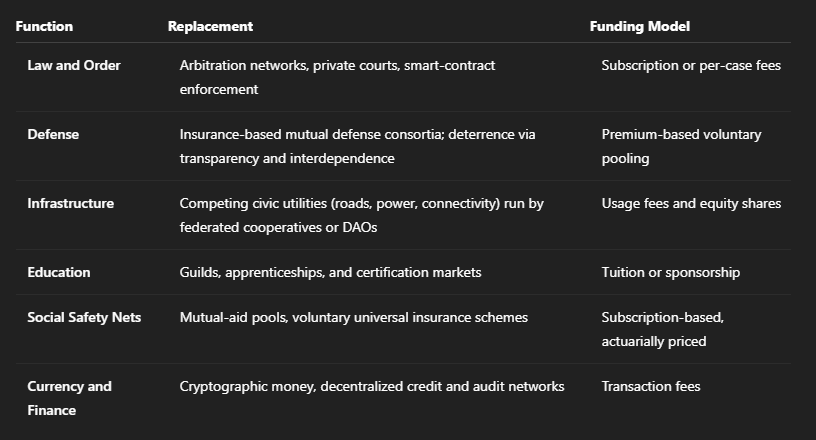Governance Without Governments
When civilization learns to govern without coercion
1. The Premise
Politics is not the end state of civilization; it is the scaffolding we use until better coordination mechanisms emerge. The modern state is a 17th‑century technology stack: centralized, coercive, opaque, and tax‑funded. Its core innovation was monopoly enforcement of law and order. That solved certain problems of chaos—but at the cost of institutionalized coercion.
For centuries, political systems have optimized for control rather than competence. They concentrate decision‑making into hierarchies that assume scarcity, distrust, and obedience. That architecture is now obsolete. Global connectivity, cryptographic verification, and self‑executing contracts make possible a new foundation for civilization—one that coordinates without compulsion.
Civilization’s next phase replaces the political layer with protocolized governance: voluntary, modular, competitive, and cryptographically enforceable. Where the state once ruled by decree, consortia will coordinate by contract. Law becomes logic; trust becomes code.
2. The Architecture of a Non‑Coercive Order
A world without coercive government is not anarchy in the pejorative sense; it is post‑political order—governance by consent, not compulsion. The institutions of civilization remain recognizable: law, defense, infrastructure, education, and welfare. What changes is their method of organization and their moral foundation.
Instead of monopolies enforced by violence, services are provided by interoperable, reputation‑driven networks. Authority becomes a function of reliability, not decree. Each system competes for trust rather than obedience.
No taxes, no compulsion—only contracts and exit rights. Competition replaces coercion. Reputation replaces regulation. In such a system, corruption is not outlawed; it is rendered unprofitable.
3. Institutional Dynamics
Private Consortia: Coalitions of specialized organizations provide justice, security, and infrastructure. They compete on efficiency, reliability, and ethical clarity. Because membership is voluntary, performance becomes the only durable source of legitimacy.
Interoperable Protocols: Common standards replace national regulation. Verification replaces trust; algorithmic transparency replaces bureaucratic opacity. Dispute resolution becomes a function of predictable computation rather than political bargaining.
Voluntary Jurisdiction: Individuals and groups affiliate with governance providers as they do with ISPs or insurers. Exit costs remain low, ensuring that accountability is enforced by freedom of association rather than coercive monopoly.
Reputation and Proof: Metrics of service quality, reliability, and fairness are auditable in real time. Governance becomes measurable, comparable, and forkable.
In this framework, politics is not overthrown but out‑competed. The state withers not through revolution but through redundancy.
4. The Transition Path
The transition to post‑political order will be incremental, emergent, and largely invisible to those living through it. It begins where coercion is weakest—digital ecosystems, borderless commerce, and autonomous infrastructure. Decentralized arbitration, crypto‑finance, and open‑source governance already outperform legacy institutions in transparency and responsiveness.
As citizens experience the superior efficiency of voluntary systems, legitimacy begins to migrate. Governments, deprived of their monopoly on coordination, will retreat to functions they can still perform well—then to none at all. The political apparatus does not collapse; it fades into irrelevance.
Just as religion yielded to science, politics yields to protocol. The process will not be linear; remnants of coercion will persist, sometimes violently. But the direction of history is clear: every epoch reduces the premium on power and increases the return on cooperation.
5. Civilization’s Trajectory
Civilization evolves by converting power into protocol. Every genuine advance—from markets to constitutions to code—reduces the surface area where coercion can hide. The long arc of progress bends not toward equality or ideology, but toward de‑politicization: fewer decisions resolved by force, more resolved by computation, consent, and contract.
This is not utopia. It is an asymptotic process—an infinite game in which each iteration builds systems that make domination less profitable and cooperation more adaptive. The ultimate measure of civilization is not wealth or technology, but how little politics it still requires to function.
The end of politics is not chaos; it is coordination evolving beyond coercion.



